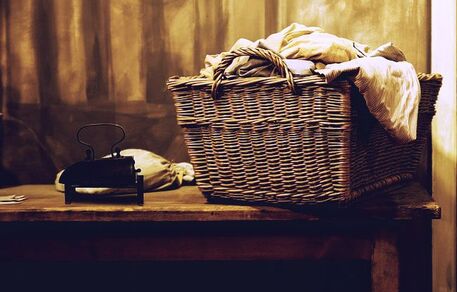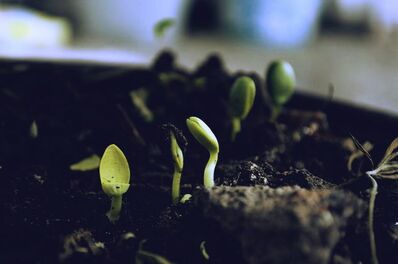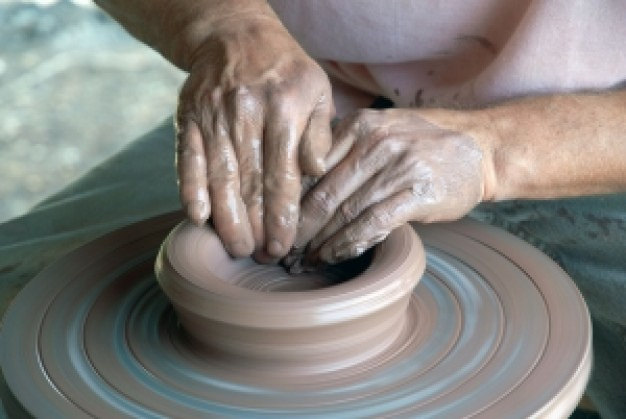|
This video essay explores making art and the resurfacing of old loves as we connect with each other and ourselves through pandemic isolation. It references the *National Geographic* article "The pandemic is giving people vivid, unusual dreams. Here’s why." by Rebecca Renner published on 4/15/2020 on NationalGeographic dot com.
1 Comment
Exploring the importance of reflecting on who we are before we decide what normal we want, and also some of my own reflections on questions vs. answers in my creative process.
Image by Gerhard Gellinger from Pixabay As a creative writing professor, one of the things I often see students struggling with is making the transition from using writing as an escape from the world's trappings to allowing writing to become the bread and butter of their lives. Many people still live under the mistaken impression that creatives must starve for lack of career opportunities, but there are so many avenues to make a great, creative living. The big things that can stop a creative career from happening have more to do with what goes on inside the artist than what's available in the world. This transition from hobby writing to professional writing is both a doorway and an obstacle to a creative career. Most school programs don't build in much information about how to navigate this, so I thought I'd share the most recent version of what I tell my students when they come to the place where the pressure is greater than the joy. There's something wonderful and terrible about going to school for the creative thing you love. More so in making a profession out of it.
The wonderful is that you can completely immerse yourself in the work that matters most to you, develop your ability to make that work more authentic and of greater quality, and build a community of people who care about pursuing their craft. The terrible thing is that suddenly this creative play that has always been a way of escaping the drudgery of life is now the drudgery. It is the stuff you must do, not just the stuff you choose to do. In school, it's the stuff you must do for grades. In career, it's the stuff you must do so you can eat and keep the lights on. One of the hardest things about going to school for writing or any art is that for the first time you must find the balance between these two. Sometimes you're going to turn in work that isn't your best. In a deadline-driven world, that will always be true. But one of the best ways to get your work closer to your best is to find a way to have fun with it, even when it's required. Art is rebellious and personal and universal and wondrous and scary all at once. When you're finding yourself under enough pressure that it stops being fun, notice, give that a nod, and look for ways that you may be able to let some of the adventure back in. I recommend artist's dates (see Julia Cameron's The Artist's Way) and rebellion. By rebellion, I don't mean jumping in a tie fighter or heading off to the Hunger Games. I mean look for something else that you can safely put off in order to have a little fun, something that is not your writing. Maybe it's laundry day. Take yourself to a coffee shop and write instead. Live with the pressure of not having clean underwear for a couple days instead of the pressure of not having freedom to write spontaneously, when you want to. Or look for an idea in the world that drives you mad because people seem to think this is how reality works, but it's not - write a bit that rebels against their misconception. This can be satire, fiction, whatever. Just something that gives you that subversive satisfaction that you're doing something you're not supposed to. Of course, that has to be balanced, too, because walking around in dirty clothes for too long has its own bad consequences, but you see what I mean. Look for ways to keep writing an adventure, or you'll grow to hate it. It gets easier to maintain the balance the more practice you have, but we all need to refresh our sense of wonder now and then.
Last night, my husband and I went to a Florence + the Machine concert. I'd bought the tickets back in February as an anniversary gift to him. He likes Florence OK (I love her), but I really bought them because of the opening act. He loves Nathaniel Rateliff & the Night Sweats.
When we got to the arena, there were signs posted apologizing that the Night Sweats wouldn't be able to play, and thanking Grace VanderWaal for stepping in to support the tour. Before I talk about the young Miss VanderWaal, the reason for this blog post, I have to tip my hat to my husband who shrugged, smiled, and stayed as excited for the show as if one of his favorites were still playing. Kidney failure and losing 100% vision will turn many people bitter, but my husband has never lost his love of life. In fact, I think it's increased. OK, back to Grace. Before last night, I'd heard only one song by her, but I'd heard it a lot. She's featured in the Google "2016 Year in Search" ad below. For over a year, I taught an essay lesson focused on ad analysis, and this was one of the ads most commonly chosen by my students. Grace's "Light the Sky" is the first sound of hope in this ad, and even after reading hundreds of essays and rewatching the ad over and over to inform my grading of these essays, I never got tired of the moment her voice breaks the silent pause that turns the tide of the ad.
Video source: https://www.youtube.com/watch?v=KIViy7L_lo8
So even though I don't know her work well, I was happy for the chance to know it better. And then there was her band on the stage - three adult musicians rallying the crowd to usher this tiny 15-year-old out to hop around with that ukulele in her glitter eyeshadow and flowered dress, singing in this otherworldly voice that was at once knowing and vulnerable. They made her look older. They contoured her cheeks and put a bow-tied scarf around her twiggish neck, and she looked like she might actually have the life experience - almost - to back up her grown-up singing. And then she spoke. She was as self-conscious and uncertain as any kid would be in front of tens of thousands of people. She was sweet and grateful and stumbling when she spoke, and didn't know what to say past thank you, and I hope you like it. And I realized she's younger than my daughter. And it kind of broke my heart. It's not that I wanted her not to have this beautiful world of possibility. It's that I kept thinking, does she ever get to hang out with other kids and just be a kid? Does she get to have sleepovers and go to the movies and have to figure out how to pool the fifty cents she found in the couch cushions with her friends to order pizza? Does she get to hate school except for that one class? Will she be able to date without the world scrutinizing her as she figures herself out? I found myself worried that the music industry would feed her uppers and deny her food to keep her peppy and thin. I found myself praying that someone was looking out for this sweetie, the way I'd want someone to look out for my daughter. I examined the band with parental suspicion. Maybe I was projecting (I'm sure I was projecting), but I think they felt protective over her, too. And I watched the crowd - you couldn't find a more loving, considerate crowd than the one at a Florence + the Machine concert, and I felt grateful for this tiny person that she was singing for people who were for her, even those of us who came to see someone else. Everyone wanted her to succeed. When she stumbled through lyrics to one of her new songs, nobody flinched, and we cheered all the harder when she opened it up and made it perfect in the next verse. There's a lot of mess in the world. We're all so fragile. But maybe there's hope. If people like Florence Welch and Grace VanderWaal keep drawing crowds, and if each of us in those crowds live out the message of hope that these ladies bring, maybe someday the world will be a safe place for talented children to share their light. God, look over this little girl and her big, beautiful voice. More from Grace here: https://www.gracevanderwaal.com/ And more from Florence here: https://florenceandthemachine.net/ Also, Get Well Soon wishes to Nathaniel Rateliff. I am planting. I've added golden dewdrops (the flowers are purple - go figure), purslane, Texas sage (not edible), to the back yard. Really, it's just a patio, but it's open to a large green space with a view of trees and the dilapidated golf course that stretches through my neighborhood. In the front, I've decided I'm up for a challenge, and planted gardenias. My husband's grandmother used to grow them, and he misses the smell. He lost his eyesight in 2016, so there's some significance to this. I also added an orchid because my friend Dawn says they're ridiculously easy, and I want something pretty out there if it turns out I'm not ready to level up to the high demands of gardenia bushes.
I am planting. I started teaching screenwriting in December, and so I am writing screenplays now. Short ones. I've written a few scripts before, but now I need to pull them into my wheelhouse rather than treating them as side adventures. Over the past three weeks, I collaborated with a colleague to write an 8-page script that we hope the film department will produce for the festival circuit. I am sending out my most polished novel to agents, and I am writing short things - poems, flash, threads of story for a novel with an ensemble cast. The soil is fertile now, but it's been a long winter for us - three years of increasingly fallow living as we journeyed through my husband's illness. He has Type 2 diabetes, and a year after losing his eyesight, he lost his kidney function. Everything extra fell away from our lives, along with some of the essentials. Our weekend adventures - we used to take meandering road trips. Living in our downtown home - we have moved to a suburban townhouse. My daughter - she moved in with her dad when the stress of living with terminal illness affected her too deeply to stay. Some losses have measurable value. Others spread their bleeding emptiness through every layer of our being. In January, we were blessed by a generous friend who gave Felix a kidney. While this hasn't brought back his eyesight, it's stabilized everything else. Felix is healthy and beginning to enjoy cooking and small adventures again. He and my daughter have laughed together a handful of times this year. Without the 3-7 weekly medical visits involved in kidney failure, or the 30-mile drive (120 miles for two round trips daily) to and from my daughter's magnet school, I am left with time. And a heap of compost. Dead things that have collected in my soul over the past three years. Sometimes, the smell overwhelms me, and I lay in bed and cry at all the loss. But on good days, I sew handfuls of my decomposed life into the soil, and I write, and I wait for the gardenias to bloom. It’s been a year since my husband’s kidneys failed. I was prepping the conference room at HD Counseling for a painting workshop. People would start arriving in about ten minutes. My phone rang, and our friend Jen told me that Felix was waiting on an ambulance. They’d been seeing a movie, and he couldn’t breathe.
It was so close to the start time that people would already be on their way to my workshop. I wouldn’t be able to cancel until everyone had arrived. Jen passed the phone to Felix. He didn’t want me to cancel. Jen promised to give me updates, and I promised I would meet them in hospital immediately after the workshop was done, sooner if he needed me. For the next three hours, I served coffee and tea and painted with a roomful of lovely humans who were ready to pack up at any moment if Felix took a turn for the worse, and ready to keep me laughing and enjoying the process of creating for as long as he did not. After cleaning up, I stopped by the house and grabbed the hospital essentials - toiletries for both of us and a week’s worth of strategically interchangeable outfits for me. My husband is newly blind. I don’t leave him alone in hospital. I followed Jen’s final text to his room number. Thanks to the painting session, I’d never been more at peace on my way to an emergency. Over the twelve months since then, the shape of our lives has continued to change, funneling through dialysis clinics, our daughter’s high school programs and the very real needs that can push a teenager toward a confident adulthood or lifelong insecurity, moving house in order to nail down a more constant budget, the erosion of my stepdad's memories, the odd circumstances of the death of my Aunt Sandy, health issues in our extended family, issues with my own health, seismic changes in family structure. It’s been a cataclysmic year for us. I am worn down to my threads. I peck at a chapter here, a painting there. I forget thumb drives when I go on writing retreats, research themes too big for me (but that are somehow easier than sitting in the mottled present tense of what is my real life). I find myself drifting. Longing for beauty. And this is why we need art. This is why we need story. This weekend, my despair was so great I couldn’t sit alone. My husband was so exhausted from having his blood artificially cleaned and pumped back into him that he had no energy to distract me. So I gobbled up What Alice Forgot by Liane Moriarty. Someone had mentioned it after they asked what my novel, The Former Lives of Buildings, was about. My protagonist, Like Moriarty's, wakes in the hospital having forgotten important events. I intentionally waited until my own book was finished before reading Moriarty’s (I’m currently shopping TFLoB around to agents). Alice's forgotten years helped me forget my losses for a day. Last week, I spent some listless time walking around Adjectives Market, a co-op type shop filled with vintage, upcycled, and original ephemera. Sometimes, when I can’t stand being in my own head, I think about which room I’ll paint next in our new place. I’ve temporarily stopped offering workshops. I haven’t hosted Artist’s Way groups in months. I am still hosting my writing circle because I don’t think I will survive these waves of loss without the collective writing experience for a few hours a month. But otherwise, I have let go of most of the peopling part of my art life. But the part where I get to leave my life for a moment by living in the head of someone else - whether it’s my character or another author’s, the part where the overlap of red oil paint just past the edge of the white strokes of a bird’s feather, even the capture of real forget-me-nots in a drop of glass on Etsy - these quiet offerings of beauty keep me breathing, in, out. They ask nothing of me across a year that has already stolen far too much. Beauty asks nothing. It just exists alongside all the ugly and lets us notice it, or not. Make art. We all need to breathe. After taking a long break from blogging to finish out my time teaching in public school, I'm excited to revive my blog 100 Pots. I'll be adding new posts and reblogging some of my older ones. Here's my very first post, and the origins of my blog title. Enjoy! A thousand years ago when I was an undergraduate student at New College of Florida, I had a quirky ceramics professor who lived in my backyard. The house I was renting with some other students had a guest house, and one day Bob and his wife showed up and moved in. Bob smoked cigars that gave of a mellow, spicy scent and did not let me into his 3-D design class, but asked me to join his ceramics class. I think it was an olive branch to be neighborly more than anything else. The design class had so much more to do with my work, and so many fewer seats than the ceramics class. I was mad, but, after all, he was my neighbor, so I accepted the invitation. It turned out to be my most memorable college class. Bob gave his students the key code to the building, and a few of us would be there at all hours of the night. And he would be, too. We'd let the slippery clay spin between our fingers, rising, falling, a meditation. Then, if Bob was there, we'd join him outside for a break while thick cigar smoke fogged the night air between us. We learned how Peter Voulkos would turn a perfect plate and then slice it with wire and patch it back together, leaving messy cracks and sensual textures. We learned about Paul Soldner's collaging clay together until it could be nothing but art, not a craft, not a cup you would drink from or a bowl you would eat from. Their work demanded new esteem for clay. Their work concentrated on the beauty of the flaw. The beauty of the flaw translates to all art. If a writer writes a perfect character, it better be a villain because nobody wants to root for a perfect person. We love the underdog, the broken, the tragic flaw. In one of our class meetings, Bob told us about a professor he'd once had. The professor divided the class into two groups. The first group had to make 100 pots. Over the course of a semester that's about seven pots a week. That's a LOT of pots. But the number was the only requirement. The pots could be any size or shape, symmetrical or lumpy, it didn't matter. If they made their hundred, the members of this group would receive A's. The second group had the entire semester to make only one pot. But the pot had to be perfect, flawless, without fingerprint, wabble, variation in wall thickness, or any other mark that a human being had anything to do with it. If they turned in one perfect pot, the members of this group would receive A's. Guess which group came closest to making the perfect pot? So I'm writing my first blog post about the phrase that keeps me moving forward with my work when I'm afraid it won't come out perfectly. I hear it in my head, in Bob's lively, round-voweled voice: "100 Pots! 100 Pots!" They will never be perfect, these words, but the more of them I write, the closer they will get. Bob was right. The ceramics class was exactly what I needed. Image: Credit. Attribution-ShareAlike License. |
100 Pots
Welcome to my blog, Archives
May 2020
Categories
All
|





 RSS Feed
RSS Feed